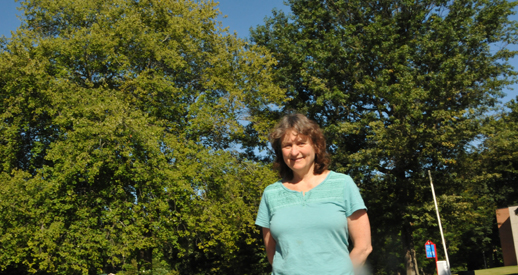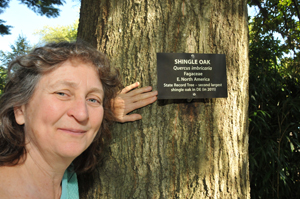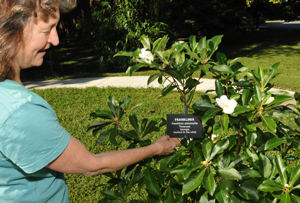
Archive
DSU Arboretum Receives Accreditation
Friday, September 6, 2013
The ArbNet Arboretum Accreditation Program and The Morton Arboretum recently announced that the Delaware State University Arboretum has been awarded a Level II Accreditation. By achieving particular standards of professional practices deemed important for arboreta and botanic gardens, DSU’s Arboretum is now recognized as an accredited arboretum in The Morton Register of Arboreta.
|
|
An arboretum is a place where trees, shrubs, and herbaceous plants are cultivated for scientific and educational purposes.
“It’s an honor for the Delaware State University Arboretum to have been awarded accreditation on the Morton Register of Arboreta. This accreditation will help raise awareness and appreciation of the great value and many uses of the campus trees and shrubs,” said Dr. Susan Yost, educator in the DSU Claude E. Phillips Herbarium.
DSU’s Arboretum is on the 400-acre main campus in Dover and is comprised of hundreds of planted trees across the campus, totaling 172 different species of trees and shrubs. Each species is labeled and a map of these plants – with lists of scientific and common names with map coordinates –is on a DSU Arboretum brochure available at the Herbarium. (See the brochure at http://herbarium.desu.edu/page5/files/Arboretum_map_brochure_2012.pdf)
The DSU Arboretum’s tree and shrub collection is diverse, making it a valuable teaching, research and ecological resource as well as beautifying the campus year-round. The 68 native species represent 40 percent of the total species. The collection includes a state record shingle oak, the second largest in Delaware, and a large black walnut, which is on the waiting list for state record tree. Recent plantings include Delaware natives such as a beach plum, American chestnut and chinquapin, as well as intriguing non-native species, such as a monkey puzzle tree, franklinia and umbrella-pine.
The Arboretum is used for teaching about trees and conservation to students as well as members of the public. Outreach programs include Master Gardener training, teacher in-service classes, elementary school programming and monthly nature walks.
|
|
In 2011 the Arbor Day Foundation recognized DSU’s main campus as a Tree Campus USA, making it one of 168 college and university campuses across the country with that designation and the only in Delaware to be recognized as such. The DSU Arboretum was formally designated in 2012, following recent plantings that resulted in a 26 percent increase in the number of tree species.
Dr. Yost has been the driving force in the University’s effort to meet the documentation and practices criteria for the accreditation and leads the work of Herbarium in the College of Agriculture and Related Sciences in maintaining the campus abundant tree collection. She notes that she was assisted by Dr. Arthur Tucker, retired director of the Herbarium, volunteer Lou Calabrese, student workers Syrena Taylor and Alisa Downes, along with many others. Dr. Yost also noted the contribution of the late Dr. Norman Dill, a former agriculture professor who planted numerous trees around the campus in the 1960s and 1970s.
DSU was founded in 1891 as the State College for Colored Students, and some of the campus trees are at least that old. In 2011, DSU became the first Tree Campus USA in Delaware. The work of the Arboretum is supported through the DSU Claude E. Phillips Herbarium in the College of Agriculture and Related Sciences.
About the ArbNet Arboretum Accreditation Program
The ArbNet Arboretum Accreditation Program is sponsored and coordinated by The Morton Arboretum in cooperation with American Public Gardens Association and Botanic Gardens Conservation International. This international initiative offers four levels of accreditation, recognizing arboreta of various degrees of development, capacity and professionalism. Accreditation is based on self-assessment and documentation of an arboretum’s level of achievement of accreditation standards. Standards include planning, governance, labeling of species, staff or volunteer support, public access and programming and tree science, planting and conservation. More information is available at www.arbnet.org.
The ArbNet Arboretum Accreditation Program is sponsored and coordinated by The Morton Arboretum in cooperation with American Public Gardens Association and Botanic Gardens Conservation International. This international initiative offers four levels of accreditation, recognizing arboreta of various degrees of development, capacity and professionalism. Accreditation is based on self-assessment and documentation of an arboretum’s level of achievement of accreditation standards. Standards include planning, governance, labeling of species, staff or volunteer support, public access and programming and tree science, planting and conservation. More information is available at www.arbnet.org.


 Each species is identified with a sign, such as this Shingle Oak which is the second largest found in the state.
Each species is identified with a sign, such as this Shingle Oak which is the second largest found in the state. The DSU Arboretum includes the Franklinia -- named after Benjamin Franklin -- which is extinct in the wild.
The DSU Arboretum includes the Franklinia -- named after Benjamin Franklin -- which is extinct in the wild.